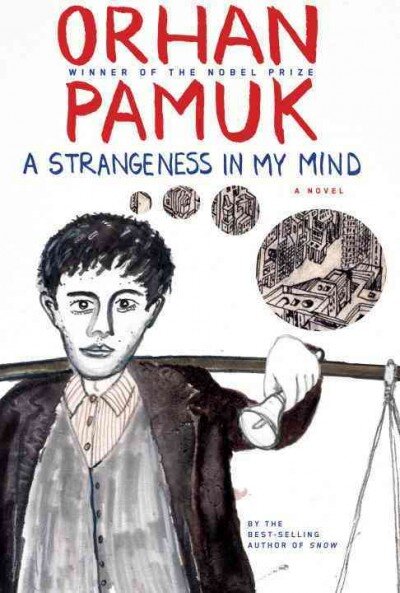http://www.npr.org/2015/10/20/450036606/orhan-pamuk-takes-a-fresh-look-at-his-beloved-istanbul-in-strangeness?
Listen to the Story
6:56
Nobel Prize winner Orhan Pamuk loves Istanbul. But he is a creature of the affluent corners of the city where he grew up and now lives, and he has written many times about the lives of Istanbul's secular upper class. His latest novel,A Strangeness in My Mind, is the story of a street peddler, one of the millions who began immigrating to Istanbul in the 1950s from small villages in the country.
On the cover of the book, underneath its paper jacket, is a picture of a city filled with intricately drawn skyscrapers. In the middle of it, a young man stands atop a domed building, looking down on the sprawl below. Pamuk himself drew the picture many years ago; he once wanted to be an artist, and studied architecture. He says all those buildings were a figment of his imagination.
"There was no such thing 25 years ago. Now, in the last 13 years, all that changed. My balcony that overlooks Bosphorus and the Asian side from Europe, now I see mushrooming skyscrapers so fast. As I was writing this book, I researched the future skyscrapers of Istanbul, I was even scared from what's coming up."
In the novel, Pamuk captures the rapid growth and change of his beloved city through the life story of an Anatolian peasant who moves to Istanbul in 1968 at the age of 12. He and his father live in a one-room house they build in one of the shanty towns on the edge of the city, where other immigrants are settling.

Jun Tsuboike/NPR
"I see the social change of the streets, of the shops, everything, of the way people behave, of the way people walk, talk, enjoy themselves in the streets of Istanbul, through the eyes of a lower-class character, Mevlut Karataş," Pamuk says.
Mevlut joins his father, selling yogurt during the day and a traditional fermented Turkish drink called boza at night. Boza has a slight alcoholic content, but that's not the main reason people love it. "It's nostalgic, it's a sort of romantic evocation of good old Ottoman times," Pamuk says. "And when the boza seller in a cold night — andboza should be enjoyed in cold days and cold nights especially — walking in the streets of Istanbul says 'Boooo-zaaaa!' you hear it, your motivation is more romantic imagination rather than 'let's have some alcohol.' "
Pamuk may share this romanticized view of the boza seller, but when he began to write about Mevlut, he knew he really had no idea what life was like for someone like him, who spent his days walking all over the city carrying a heavy load on his shoulders.
"I was the boy who was buying boza from Mevlut," Pamuk says. "When he came up, my grandmother opened the window, 'OK, boys, let's have some boza,' when he went up the stairs and gave us this magic liquid. I also saw the shanty neighborhoods, the poor neighborhoods from outside. For this book, I did extensive interviews with all these people, some of them 90 years old, who sold things in the streets of Istanbul. This book is heavily based on one-to-one interviews with many people."
A Strangeness in My Mind is also a love story, albeit one that gets off to a rough start. Mevlut falls madly in love with a woman after seeing her for just a moment at a family wedding. For three years, he writes her passionate love letters. Finally, with the help of his cousin Sulayman, he arranges to elope with her — only to discover that he has run off with the wrong woman.
Her name is Rayiha, and she is the sister of the woman Mevlut thought he loved. Despite this strange beginning, the two have a warm, passionate marriage. Rayiha not only supports her husband as he struggles to make a living, but she also gives meaning to his life. Pamuk says as he has grown older, his ideas about love have changed.
"And my understanding of love is not putting on a pedestal the first years or first romantic feelings, or the things that pop songs put on a pedestal. But I care about longevity, the struggle together, the friendship, sharing of the secrets, the partner being the center of the world."
Mevlut not only wanders through the city selling his wares; he also wanders through his life. He has a naive charm that attracts people to him. He is a witness to the many conflicts that are shaping Turkish culture, but he never gets swept up by any of it.
"My character Mevlut helped me — and of course my readers — go into strange corners of Istanbul, its history, various religious sects, political organizations, poor little shops, restaurants, and then, if he had strong opinions about everything he wouldn't have survived, because they would have attacked him. He is in that sense an Everyman, but an Everyman with a strange mind which is perhaps like my mind."
Pamuk says he is, in a way, Mevlut, "because I share his mind — not his life, though. ... In fact, I always tell my friends, 'You may not like my novel, but I'll be so happy if you like Mevlut,' and the Turkish reaction to it, I was very happy: They will never tell me the title of my book; they say, 'I read Mevlut, I like Mevlut, I like it!' "
Pamuk believes that reading a novel carries with it a kind of moral obligation to see the world from another person's viewpoint. He created Mevlut with that in mind. "I spent six years with my Mevlut," he says — the privileged, much-honored writer, trying to see his beloved city from a very different perspective.


沒有留言:
張貼留言